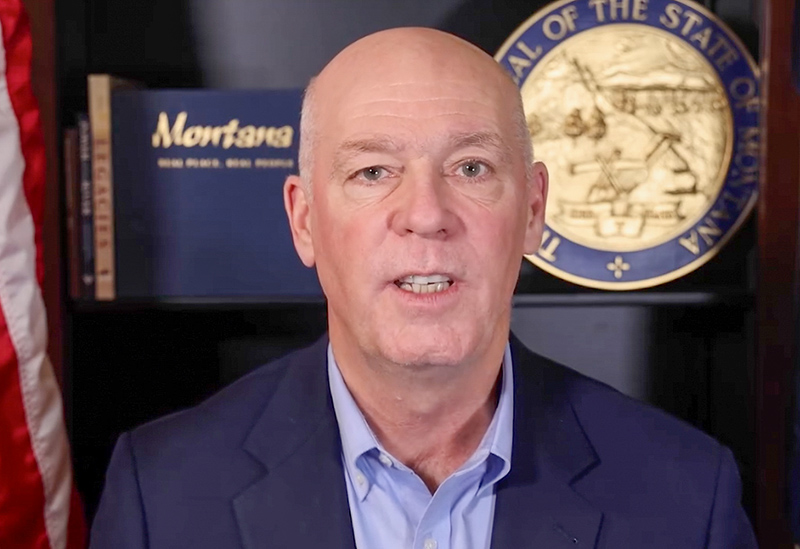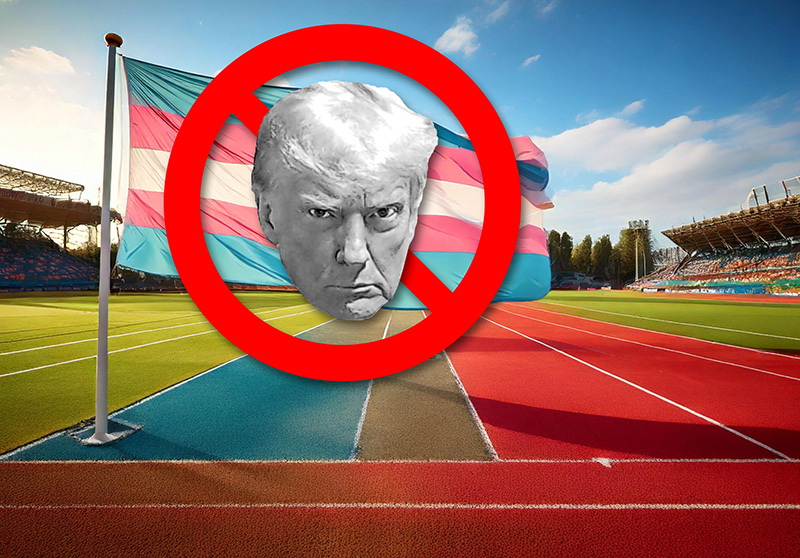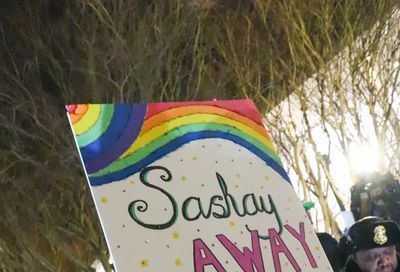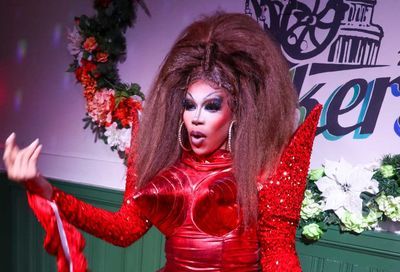Online transphobia fueled by race and politics, landmark new study reveals
Study shows the escalation from transphobic comments to calls for violence and genocide
By Rhuaridh Marr on October 25, 2019 @rhuaridh

A landmark new study has found that discussions surrounding race are the single biggest driver of transphobia online in the U.S.
Anti-bullying charity Ditch the Label worked with Brandwatch to analyze more than 10 million public posts between January 2016 and May 2019, in an effort to research transphobia.
The resulting study, “Exposed: The Scale of Transphobia Online,” found 1.5 million instances of digital transphobia, with race identified as the most common theme of transphobic posts in the U.S. and politics the most common theme in the U.K.
“This report should act as an eye opener,” Ditch The Label said in a tweet. “Equality and respect for all humans regardless of how they choose to identify or look needs to be the standard. The issue is not trans people, it’s the way society views trans people.”
Warning: This article contains language that some may find offensive.
Ditch the Label noted that former First Lady Michelle Obama was “at the epicenter of much of the amplification of transphobic language during the time period we analyzed, with conspiracy theorists suggesting she is trans, and frequently calling her ‘Mike’ or ‘Michael.'”
The charity also noted that Donald Trump’s decision to ban transgender people from serving in the military fueled further transphobia, as did the Boy Scouts of America‘s decision to allow pre-teen and teen girls to join.
Ditch the Label found that the single most-used transphobic term online was “tranny” or “trannies,” accounting for over one million of the transphobic posts found during the study.
“Shemale” was the second-most used term, with over 156,000 mentions, and “gender bender” the third most-used term with over 56,000.
YouTube had one of the highest ratios of transphobic posts
The study compared constructive discussions of transgender issues versus transphobic comments and abuse across a number of different websites, and found that Instagram had the lowest ratio of abuse, comprising just 5% of posts.
YouTube overwhelmingly had the largest percentage of transphobic posts, relative to discussions of the issue, with 78% of trans-related posts found to contain transphobic abuse.
Ditch The Label also found that, compared with the U.K., “mentions across most of the site categories were more hostile in the U.S.”
“This report does not make for light reading as it uncovers the shocking and inhumane ways in which transgender people are targeted, harassed, and abused on digital platforms,” Ditch The Label CEO Liam Hackett said in a statement. “The online posts we uncovered, some of which have been shared thousands of times, range in severity from transphobic attitudes through to genocide and violence.”
The organization created a Pyramid of Transphobia to highlight how, left unchallenged, “digital hate speech can and does evolve into acts of physical violence committed towards trans people,” Hackett said.
The pyramid, modeled on the Anti-Defamation League’s Pyramid of Hate, shows how behaviors on the lower tier — transphobic attitudes, acts of trans bias — can support and lead to higher-level behaviors, such as transphobic violence and trans genocide.
Hacket said that Ditch The Label hoped its report would “bring the problem to the forefront of public conversation, and encourage an urgent review of hate speech guidelines on social platforms and in law.”
‘You have to be dead inside to not let it bother you’
Trans model and activist Munroe Bergdorf said that the findings of the study “don’t surprise me.”
“As someone who is in the public eye, I experience abuse on a daily basis and I worry that there are people in my community who don’t have the support systems to allow them to access the strength to deal with abusive behaviors,” Bergdorf wrote in Ditch The Label’s report. “I’ve seen most of the transphobic comments in this report on my timeline, ranging from memes and abuse to actual threats to my safety.”
Bergdorf noted the correlation between transphobic comments and race — the most common theme in the U.S. and the second-most common in the U.K.
“As a trans woman of color, being subjected to these comments is extremely difficult to navigate,” she said. “You have to be dead inside to not let it bother you and it’s made even harder when you experience it all the time and the people perpetrating it don’t seem to be sanctioned for their behavior.
“I was interested to see the relationship between transphobia and racism and do feel that racist people see transphobia as a tool to legitimize their racism. I’ve had transphobic comments on photos of me mixed in with nazi speech a number of times.
“Transphobia is seen as a valid opinion,” she added. “We never look at racism, sexism or homophobia and say it’s an opinion, so why is transphobia such a ‘free for all?'”
Read more:
Republican Jennifer Williams could become New Jersey’s first openly transgender legislator
Attacks on LGBTQ Ugandans increase after government flirts with passing revived “Kill the Gays” bill
Majority of Americans support workplace protections for LGBTQ people
Republicans join Democrats to Defeat Anti-Drag, Anti-Trans Bills
Montana lawmakers have rejected a pair of bills seeking to ban drag in the state and remove trans children from their parents' custody.
By John Riley on March 10, 2025 @JRileyMW
Lawmakers in the Montana House of Representatives defeated two anti-LGBTQ bills last week after the chamber's transgender and nonbinary representatives gave impassioned speeches protesting the measures.
State Rep. Zooey Zephyr (D-Missoula), the legislature's first out transgender representative, spoke out against House Bill 675, sponsored by Rep. Caleb Hinkle (R-Belgrade), which sought to ban drag performances and Pride parades in Montana.
Hinkle previously sponsored a ban on public performances of a "sexual nature" that was specifically intended to target drag shows and Drag Queen Story Hour-type events (even if they do not contain sexually explicit content).
Montana Governor Signs Anti-Trans Bills into Law
Montana Gov. Greg Gianforte has signed two bills banning transgender people from bathrooms matching their gender and from women's sports.
By John Riley on March 30, 2025 @JRileyMW
Montana Gov. Greg Gianforte signed two anti-transgender bills into law, one of which bars transgender people from public restrooms matching their gender identity and the other banning transgender women and girls from female-designated sports teams.
The laws were passed on party-line votes in both legislative chambers, with Republicans voting in the affirmative.
The first law requires public schools, correctional facilities, other public buildings -- including the state Capitol -- and domestic violence shelters to designate bathrooms, changing facilities, and sleeping areas for a single sex -- male or female. Entry to such spaces will be based on a person's assigned sex at birth, as determined by a person's chromosomal makeup.
State Dept. Permanently Bans Trans Athletes from Entering U.S.
Trans athletes seeking to travel to the U.S. for women's sporting events will be permanently forbidden from entering the country.
By John Riley on February 26, 2025 @JRileyMW
The U.S. State Department has ordered officials worldwide to deny visas to transgender athletes attempting to come to the U.S. for sports competitions.
It is also ordering permanent visa bans against transgender people whose gender marker on their application doesn't match their assigned sex at birth.
A State Department cable obtained by The Guardian instructs visa officers to enforce a section of the Immigration and Nationality Act that allows the United States to refuse entry to any visa applicant who commits identity fraud or misrepresents who they are.
Unlike regular visa denials, anyone violating that section can be permanently refused entry to the United States, effectively constituting a lifelong ban.
Support Metro Weekly’s Journalism
These are challenging times for news organizations. And yet it’s crucial we stay active and provide vital resources and information to both our local readers and the world. So won’t you please take a moment and consider supporting Metro Weekly with a membership? For as little as $5 a month, you can help ensure Metro Weekly magazine and MetroWeekly.com remain free, viable resources as we provide the best, most diverse, culturally-resonant LGBTQ coverage in both the D.C. region and around the world. Memberships come with exclusive perks and discounts, your own personal digital delivery of each week’s magazine (and an archive), access to our Member's Lounge when it launches this fall, and exclusive members-only items like Metro Weekly Membership Mugs and Tote Bags! Check out all our membership levels here and please join us today!
The Magazine
-
Most Popular
 'Porn Star University' Started by Gay-for-Pay Creator Andy Lee
'Porn Star University' Started by Gay-for-Pay Creator Andy Lee  The Commanding Style of Nathan Lee Graham
The Commanding Style of Nathan Lee Graham  Anheuser-Busch Abruptly Ends Sponsorship of St. Louis PrideFest
Anheuser-Busch Abruptly Ends Sponsorship of St. Louis PrideFest  Film: Spring Arts Preview 2025
Film: Spring Arts Preview 2025  Montana Governor Signs Anti-Trans Bills into Law
Montana Governor Signs Anti-Trans Bills into Law  Utah Bans the Pride Flag
Utah Bans the Pride Flag  Stage: Spring Arts Preview 2025
Stage: Spring Arts Preview 2025  Win Tickets to Awesome Con!
Win Tickets to Awesome Con!  Riki Wilchins: 'Not Passing is Now a Criminal Offense'
Riki Wilchins: 'Not Passing is Now a Criminal Offense'  Trump Targets Law Firm for Defending Transgender Rights
Trump Targets Law Firm for Defending Transgender Rights
 Utah Bans the Pride Flag
Utah Bans the Pride Flag  3 Million People Could Die Due to HIV Funding Cuts
3 Million People Could Die Due to HIV Funding Cuts  Celebrities Urged to Boycott Hungary Over Pride Ban
Celebrities Urged to Boycott Hungary Over Pride Ban  The Commanding Style of Nathan Lee Graham
The Commanding Style of Nathan Lee Graham  Texas 'Sexual Content' Bill Would Criminalize Literary Works
Texas 'Sexual Content' Bill Would Criminalize Literary Works  Awesome Con Celebrates the Geek in All of Us
Awesome Con Celebrates the Geek in All of Us  Win Tickets to Awesome Con!
Win Tickets to Awesome Con!  Film: Spring Arts Preview 2025
Film: Spring Arts Preview 2025  Classical & Choral Music: Spring Arts Preview 2025
Classical & Choral Music: Spring Arts Preview 2025  Broadway: Spring Arts Preview 2025
Broadway: Spring Arts Preview 2025
Scene
Metro Weekly
Washington's LGBTQ Magazine
P.O. Box 11559
Washington, DC 20008 (202) 638-6830
About Us pageFollow Us:
· Facebook
· Twitter
· Flipboard
· YouTube
· Instagram
· RSS News | RSS SceneArchives
Copyright ©2024 Jansi LLC.











You must be logged in to post a comment.